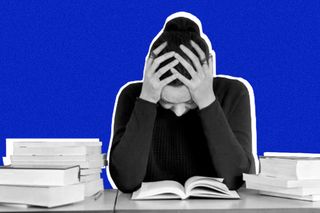
Study: Academic Pressure Joins Racism, Poverty as Biggest Threats to Teen Well‑Being
There’s a problem when school is comparable to trauma.

Three experiences have long been known as the big risk factors to adolescent well-being: poverty, racism and trauma. Now, however, there’s a fourth: sustained pressure to excel at school.
The report, published by the Robert Wood Johnson Foundation in the US, focuses on American school children enrolled in high-achieving schools in wealthy neighborhoods, but its conclusions resonate here, where student mental health has been under the microscope across socio-economic classes; earlier this year, Quartz reported that one student in India commits suicide every hour; one-quarter of these are thought to be related to failure at exams. Last month in Kota, the capital of academic coaching known for its high-pressure environment, the suicides of two students raised Kota’s to-date total to 13 student deaths so far — almost double 2017’s total. Academic pressure is thought to be the motivation behind both suicides.
Government campaigns and schools are slowly instituting changes aimed at helping students better cope with academic pressure, but most appear focused on college-aged young adults, or young children, leaving a micro-generation in between with only one source of support: parents (assuming, of course, that parents aren’t a source of the academic stress).
“Parent-child relationships continue to serve as instrumental sources of support throughout adolescence,” says Ashley Ebbert, Arizona State University psychology graduate student, who, along with psychology faculty Frank Infurna and Suniya Luthar conducted recent research into how the parent-child relationship influences the mental health of adolescents under high academic pressure. “The quality of these connections can have ripple effects on adjustment and mental health outcomes.”
However, the preteen and teen years are characterized by a developmental milestone that makes these quality connections difficult: children are wired to pull away from their parents during these years, in preparation for the self-sufficiency of adulthood. And it starts earlier than many realize; the developmental need for autonomy is greater in the preteen years than at age 18.
This pulling away, if not carefully navigated, can leave adolescents feeling alienated from and distrustful of parents — which corresponds to poorer mental health among students under academic stress, say Ebbert and team’s findings.
So what is the secret to navigating this time in a way that supports kids dealing with academic pressure?
“Always come across as someone who is open to discussing everything,” Paras Sharma, a programme coordinator at the mental health helpline iCall told The Swaddle in 2015, when student mental health was first garnering attention. “You may agree or disagree, but you should at least be open to discussing it.”
*
For more practical advice, tune into the next installment of The Swaddle’s Facebook Live series ‘Tough Questions’ at 12.30 pm IST on Friday, 16 November, when educational psychologist Tripti Singh will be taking discussing how to help children cope with academic pressure and taking live questions.
Related


Convincing Yourself You’re Multitasking Can Make You More Productive
